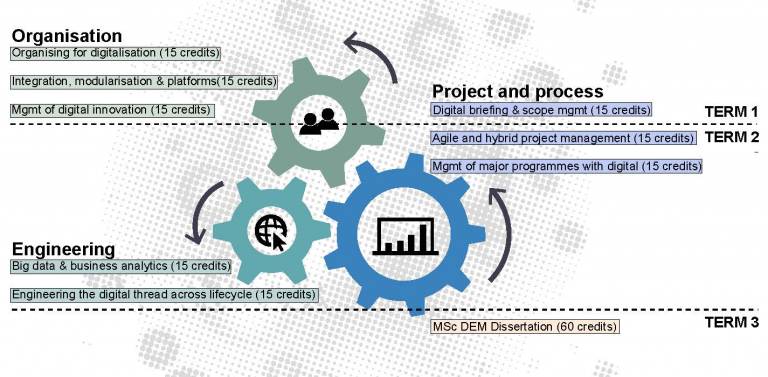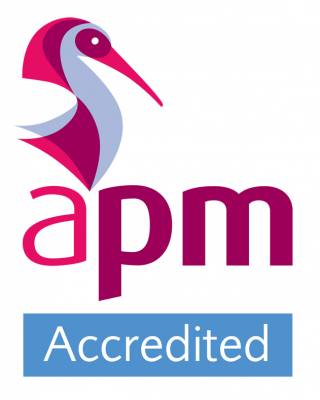The Digital Engineering Management MSc is designed to equip students with an understanding of digital engineering and develop them into leaders and managers in the built environment sector.

Register for our In-person UCL East Graduate Open Evening (Wed 28 Feb, 5pm)
On this page
- Overview
- Course content
- Structure and assessment
- Study modes, entry requirements, fees and funding
- Programme staff
- Careers
Overview
This course will equip students with an advanced understanding of how digitalisation influences the management of engineering, particularly in the built environment, building upon the premise that technology is a socio-technical construct. Because digital innovation is not constant but continuously evolving, this course will provide the tools to address these challenges within an engineering management framework.
The course has three main aims:
- provide an understanding of engineering management through a socio-technical lens and in particular with regards to digitalisation in both theoretical and applied aspects
- develop critical thinking and research spirit in decision-making and problem-solving in the context of construction projects
- equip students with the range of analytical tools, digital skills and transferable skills required for a career in the built environment
Digital engineering describes the integration of various digital technologies, such as Building Information Modelling (BIM), mixed realities, big data analytics and blockchain that radically transform the construction sector. The course will teach you both the basics of innovative digital technologies in the built environment at a skills levels and also their managerial implications at a theoretical level.
Term 1 of the course will be based at Here East in Stratford from 2020/2021 and move to the brand-new UCL East campus after the 2023/24 academic year.
“Prospective students will benefit from a fresh look at digitisation in the built environment, looking beyond teaching software tools, into a grounded and comprehensive curriculum developed from translating own research and in collaboration with industry partnersProspective students will benefit from a fresh look at digitalisation in the built environment, looking beyond teaching software tools, into a grounded and comprehensive curriculum developed from translating the School's world-leading research, and through collaboration with industry partners - Dr Eleni Papadonikolaki, Former Programme Leader
Course content
The teaching and learning philosophy of the Digital Engineering Management MSc combines scenario-based learning from management studies, as pioneered by the Harvard Business School case teaching method and project-based learning from engineering studies.
The course delivers content through three main knowledge areas: Organisation, Project and process, and Engineering.
The course has several core compulsory modules and a dissertation:
- Organising for digitalisation - organisational-view of digitalisation
- Management of digital innovation - digital innovation from an organisational and project view
- Digital briefing and scope management - focus on the front-end of projects
- Integration, Modularisation and Platforms - new business models to address industrialisation
- Big data and business analytics - data engineering due to and for digitalisation
- Engineering of the digital thread across lifecycle - integration of hands-on digital engineering processes
- Agile and hybrid project management - novel approaches to project management
- Management of major programmes with digital - high-level view of projects with emphasis on major programmes
- Dissertation module - original piece of research with guidance from supervisor
Please note that the list of modules given here is indicative. This information is published a long time in advance of enrolment and module content and availability is subject to change. For morte information, please refer to the UCL Graduate Prospectus.
Students undertake modules to the value of 180 credits. Upon successful completion of 180 credits, you will be awarded a Digital Engineering Management MSc.
The dissertation is an opportunity to explore an area of interest with a supervisor in great depth and conduct research and project work to contribute to theory and knowledge in the field. The dissertation will typically involve fieldwork.
Structure and assessment
The programme is delivered through a combination of teacher-led and student-led teaching including lectures, seminars, group tutorials/workshops, Harvard case teaching method, and individual supervision for the research-based dissertation element. Assessment is through examinations, 2,500-word written term papers, smaller digital deliverables, group work and the 10,000-word dissertation.
As the programme features a combination of teacher-led and student-led teaching including lectures, seminars, group tutorials/workshops, Harvard case teaching method, and individual supervision for the research-based dissertation element, the contact hours and self-directed study vary across the modules. In principle, 25% of a student's time is spent in student-led teaching (such as group tutorials/workshops, Harvard case teaching method), 25% in teacher-led teaching (such as lectures and seminars) and the remainder in independent study.
Study modes, entry requirements and fees and funding
Duration: The course can be studied full-time over one year or part-time over two to five years.
Full time students attend four full weeks in Term 1, and two days a week for 10 weeks in Term 2.
Part time attend two full non-consecutive weeks in Term 1, and one day a week for 10 weeks in Term 2.
Modular/flexible students attend maximum two full non-consecutive weeks in Term 1, and one day a week for 10 weeks in Term 2 under consultation with course leader.
Accreditation: MSc Digital Engineering Management is accredited by the Association for Project Management (APM).
Entry requirements: Read the full entry requirements for this course on the UCL Graduate Prospectus.
Fees and funding
Fees: Tuition fee information can be found on the UCL Graduate Prospectus.
Funding: For a comprehensive list of the funding opportunities available at UCL, including funding relevant to your nationality, please visit the Scholarships and Funding section of the UCL website.
Programme staff
The MSc core teaching staff are members of the Bartlett School of Sustainable Construction exploring the management of projects, the management of project-based organisations, sustainability and social networks. These staff are supplemented by industry experts. This ensures the connection of teaching with both current research and best industry practice.
Programme leader
Dr Carlos Galera Zarco
c.galerazarco@ucl.ac.uk
Programme staff
Mr Maurizio Sammarco, Dr Angelo Markopoulos, Dr Nicola Moretti, Dr Abdul Majeed Mahamadu, Dr Weiwei Chen
Teaching and Learning Administrator
Suzanne Hogan
suzanne.hogan@ucl.ac.uk
Careers
This MSc is multi-disciplinary and graduate career options are varied. After completing this course, graduates are expected to go on to work in many related areas: public sector infrastructure client organisations, construction, engineering and design enterprises, professional consultants and commercial research organisations, and client enterprises with significant project portfolios in the built environment. A number of our students could use the MSc as a foundation for MPhil/PhD research.
The MSc is well-connected to industry through guest lecturers from practice and site visits and you will broaden your career/employability network during it. Visits to the industry and interactions with other academic groups in the UK, Europe and overseas will add varying and pragmatic perspectives to your learning experience.
Additionally, through events aimed at industry and alumni organised by the Bartlett School of Sustainable Construction, you will have the opportunity to meet like-minded professionals in the field. As a result your understanding of digital engineering and management will put you in a position of being able to converse well with industry on this complex area. Each year the School also hosts a series of careers events for students - including CV and interview skills sessions, a dedicated Careers Fair, site visits and an alumni panel event. UCL Careers also offers a regular programme of careers fairs and practical sessions on careers advice.
- Learn more about careers support available at the School
- Find out more about our School alumni and their career paths
More information
- For key information, including how to apply, visit the UCL Graduate Prospectus
 Close
Close




